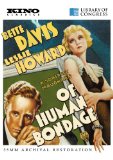| Reviews & Columns |
|
Reviews DVD TV on DVD Blu-ray 4K UHD International DVDs In Theaters Reviews by Studio Video Games Features Collector Series DVDs Easter Egg Database Interviews DVD Talk Radio Feature Articles Columns Anime Talk DVD Savant Horror DVDs The M.O.D. Squad Art House HD Talk Silent DVD
|
DVD Talk Forum |
|
|
| Resources |
|
DVD Price Search Customer Service #'s RCE Info Links |
|
Columns
|
|
|
Of Human Bondage: Kino Classics Remastered Edition
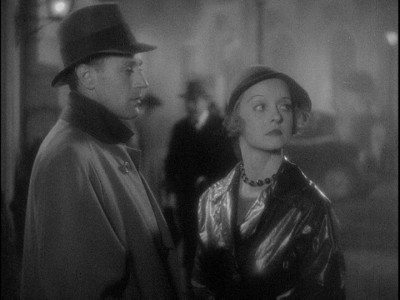
As usual, Bette Davis's reputation precedes her, and one of the biggest surprises for a newcomer (this viewing was my first time) about Of Human Bondage -- John Cromwell's 1934 adaptation of W. Somerset Maugham's novel for RKO, and the film that made Davis a star -- is how intermittent her onscreen presence actually is. Her character, a rather unreasonably haughty and demanding waitress, is only one of the film's three perfectly attractive, interesting candidates for the affections of central protagonist Philip Carey (Leslie Howard, Davis's future costar in The Petrified Forest), a failed artist afflicted with a clubfoot who's trying to make it through medical school. But it's Davis's sniping, prideful, short-term-thrill-seeking Mildred, whose treatment of Carey only ranges from tolerant to parasitic to spiteful, that he really wants; her cruelty and vanity translate to a forceful, indeed insurmountable (it's the "bondage" of the title) attraction on Carey's part. Mildred's louche, unhindered, uncultivated manner does for him what the more genuine and feasible affections of writer Norah (Kay Johnson) or country girl Sally (Frances Dee, I Walked with a Zombie) cannot -- pulls him into a vortex of unstoppable obsession that he doesn't even really want to resist, even though it nearly ruins his life. As you watch the film and are drawn along with Carey into his irrational but overpowering attraction to Mildred, it's abundantly clear why the ever-indefatigable Davis mounted a hard-fought campaign for the role (it meant stepping outside of her Warner Brothers contract, and her British costars deemed her ill-suited): The raw, dangerous sexual power of this character (and that's decidedly what it is; Mildred is not very nice and not very smart, however conniving, and Davis audaciously embraces this) is the engine of a film whose theme is inexplicable, unjustifiable, and self-destructive, yet still overpowering, erotic obsession. Relatively small(er than Howard's) number of scenes and lines notwithstanding, the reason Davis astutely and rightly saw this as the plum role that would break her out of typecasting -- the reason it's thought of as her picture -- is because Mildred's presence and what it means hangs heavy, suffusing every scene like some delicious-smelling poison.
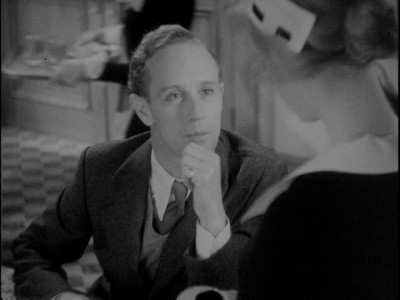
Of course, when Davis isn't onscreen (and even when she is), star power even at its most daring and illustrious can only be at most a gem in need of the right setting, and Howard, director Cromwell, and screenwriter Lester Cohen provide a most well-crafted and suitable one. Howard's character is a romantic, deluded and bound to be disappointed; the film's prologue, in which Carey's starving-artist Parisian dreams are dashed by the kind but honest appraisal of a mentor, is the perfect introduction, a miniature of the much deeper, more bitter disillusionment his gauzily romantic(izing) nature will face at Mildred's hands over the next 80 minutes. The figure Davis cuts is like one of his intelligently but talentlessly painted female nude studies come to life, the same kind of delusion that seems to hold a promise that, cruelly but unmistakably, isn't there.
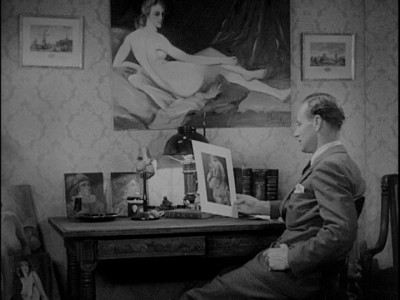
Cromwell and cameraman Henry W. Gerrard (The Most Dangerous Game) highlight this with some considerable imagination and expertise, both with effects/superimpositions that visually posit Davis herself as an imaginary artist's rendering of an ideal as sketched by Carey, and through a carefully dense mise-en-scene that subtly plays up Mildred's similarities, for Carey, to the paintings he still keeps prominently hung in his apartment; he knows they're vulgar and unworthy, but he has so much romantically invested in them that he sees something that's not there. It's as riveting as it is disconcerting to watch Carey's hopeless idolization and pursuit of Mildred, who strings him along and uses him as dictated by her bluntly mercenary nature; Howard (in conjunction with judicious writing and cutting) somehow makes his inexpressible pain, over Mildred's rejection and his physical deformity (which, she brutally informs him, are directly related) palpable through his stiff British upper lip and stoicism, and it's heartbreaking. But Cromwell and Cohen use Davis's full-bore immersion in her character's hardness and her simultaneous magnetism to acknowledge the streak of moth-to-flame masochism at work, too, using unusually sharp high- and low-angle shots in the scene of Mildred's and Carey's first meeting (she's serving, he's a patron, but those social roles are thoroughly belied by the scene's blocking and playing) to highlight the foreboding, worship-inspiring, goddess-like stature this crass waitress takes on for the educated future doctor and scarcely letting us forget it thenceforth.
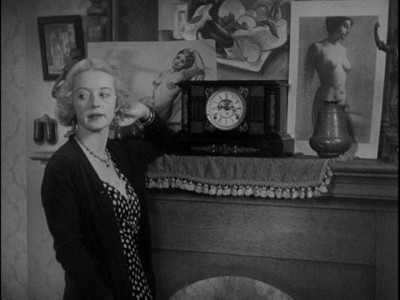
That isn't to say that Cromwell's frequently inspired visual/dramatic choices and Cohen's well-structured script break any molds: Some of the devices used (a single-day calendar's sheets falling away to show the passing of time) are nicely done but standard-issue. The film also occasionally falls into the literary-adaptation trap of tending to the overly wordy, and there probably wasn't much that could be done with the symbolism of Carey's clubfoot as the physical hindrance/handicap that embodies the spiritually crippling effect of his romantic delusions; it's the kind of thing that can work in a novel better than on the screen, though what Cromwell and Gerrard do visually with the motif of tracking shots of feet in motion -- Carey's and Mildred's, encumbrance and alacrity, bondage and freedom -- is more successfully interesting and resonant.
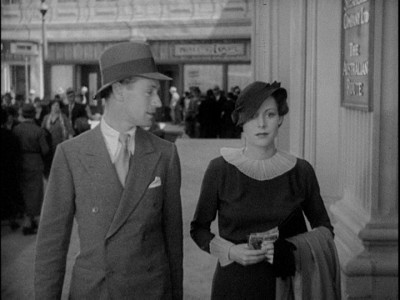
Small flaws or mundanities aside, though, Of Human Bondage has a depth and power it that's seen it this far and that it seems likely to retain over repeat viewings. Such is the spell it casts, with Davis's display of the cruel and haughty terms of sexual hierarchy, that -- like all the great movie melodramas (All That Heaven Allows being the prime specimen) -- its happy ending, with health, wholeness, and wisdom finally attained, seems dubious, obligatory, nigglingly unsatisfactory after all the turmoil; the film has evoked so well the irresoluble tug of war between the self-destructive, heedless, and erotically/romantically impulsive and the responsible, well-considered, somehow not quite so thrilling or irresistible partnership with someone you have something in common with, and who respects and understands you. Carey lands, finally, in a safe haven, though it takes the actual poverty-imposed decline and tubercular death of Mildred to free him. But the film's emphases and Davis's performance make any cozy safety or reassurance Carey has at the conclusion seem provisional only; he must know as well as we, after all we've lived through with him and Mildred, that even from the well-buried past and beyond the grave, some part of him will always be haunted by, bound to, his romantic delusions, however impossible or corrosive their glory has proven to be.
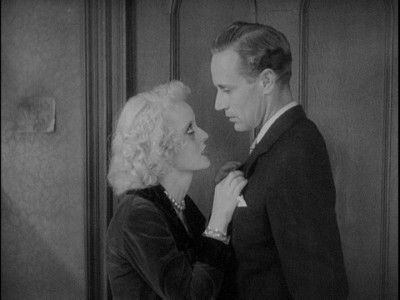
Video:
Though made from a print that's been restored for the Library of Congress archive, and thus presumably the best, most careful and faithful restoration we'll ever have, this transfer -- presenting the film at its original 1.33:1 aspect ratio -- reveals much irremediable wear and tear to what must have been the best source materials available, including multiple scratches, jumps, marks, and tears. Still, it's a reasonably whole and vibrant image throughout, with good contrast and a respectful adherence to celluloid texture and grain (not too much digital noise reduction) and virtually no compression artifacts (aliasing, pixellation, edge enhancement) to speak of.
Sound:The film's mono sound comes through with nice clarity on the disc's Dolby Digital 2.0 sound track. It's due to the limitations of 1934 sound technology that there's a certain tinniness to the dialogue and blare to the music, which sound natural for a picture of this vintage; overall, all things considered, the sound is solid, clear, resonant, and quite pleasing.
Extras:Revealing Somerset Maugham (2012, approx. 90 min.), a feature-length documentary on the Of Human Bondage author by Michael House. It's a simple, conventional -- completely PBS-ready -- but effectively engaging and informative rundown of Maugham's interesting, troubled life (as an open-secret gay man in an inhospitable time) and career (as a stubbornly accessible novelist/playwright in the high-modernist literary era of Proust, Joyce, and Woolf). With bountiful photos and film clips of Maugham himself, and featuring new interviews with his biographer Selina Hastings; writer-admirers like Pico Iyer, Alexander McCall Smith, and Armistead Maupin; and even a present-day editor at his publisher, Random House, who set up and runs the Maugham Facebook page.
--A selection of trailers for other Kino Classics titles (Pandora and the Flying Dutchman, etc.).
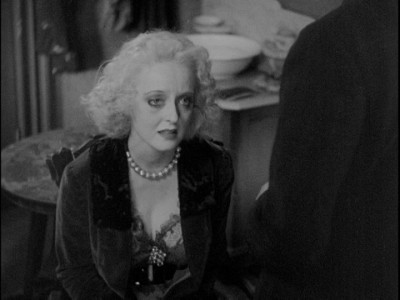
Classic-Hollywood melodrama at its most Studio-Golden-Age well-crafted, this 1934 silver-screen version of W. Somerset Maugham's perennially admired and beloved novel is surprisingly fluent and hard-hitting. To tell the story of Maugham's very unlucky-in-love, club-footed dreamer, a medical student (played by Leslie Howard with an apart and heartbreaking stiff British upper lip) masochistically attracted to an inveterately calculating, pleasure-seeking waitress (Bette Davis), director John Cromwell delights in conveying actions and feelings visually, with an aplomb that overrides the very occasionally over-expository, cliché-reliant creakiness of Lester Cohen's script. But it's Davis, I will concur with the rest of the known world, whose intermittent but insidiously dominant presence makes the film a must-see; she's its unlikeable, uncompromising mystery, and all the tension so skillfully built by Cromwell rests on the foundation of her tough, inscrutable, doomed fascination for the lovelorn man whose heart falls into her careless, cruel hands. And for us: This is a story of obsession that slyly uses the resources of cinema (not least Max Steiner's lush, heavy-hearted score) to channel Davis's first big burst of undeniable star power in a way that implicates us as well; we understand, despite our more rational selves, Howard's irrational fixation on her, and by the end, we're as besotted and heartbroken (and only ambiguously relieved by his too-narrow escape) as he. Highly Recommended.
|
| Popular Reviews |
| Sponsored Links |
|
|
| Sponsored Links |
|
|
| Release List | Reviews | Shop | Newsletter | Forum | DVD Giveaways | Blu-Ray | Advertise |
|
Copyright 2024 DVDTalk.com All Rights Reserved. Legal Info, Privacy Policy, Terms of Use,
Manage Preferences,
Your Privacy Choices | |||||||









